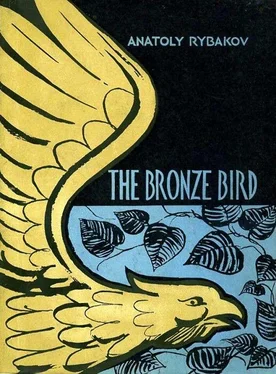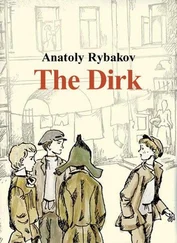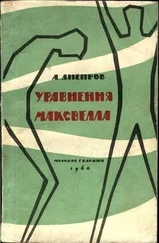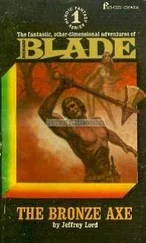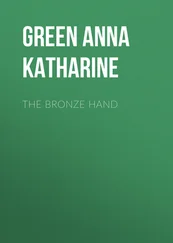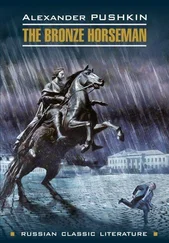Anatoly Rybakov - THE BRONZE BIRD
Здесь есть возможность читать онлайн «Anatoly Rybakov - THE BRONZE BIRD» весь текст электронной книги совершенно бесплатно (целиком полную версию без сокращений). В некоторых случаях можно слушать аудио, скачать через торрент в формате fb2 и присутствует краткое содержание. Город: Moscow, Год выпуска: 1956, Издательство: Foreign Languages Publishing House, Жанр: Детские приключения, Детектив, Исторические приключения, на английском языке. Описание произведения, (предисловие) а так же отзывы посетителей доступны на портале библиотеки ЛибКат.
- Название:THE BRONZE BIRD
- Автор:
- Издательство:Foreign Languages Publishing House
- Жанр:
- Год:1956
- Город:Moscow
- ISBN:нет данных
- Рейтинг книги:5 / 5. Голосов: 1
-
Избранное:Добавить в избранное
- Отзывы:
-
Ваша оценка:
- 100
- 1
- 2
- 3
- 4
- 5
THE BRONZE BIRD: краткое содержание, описание и аннотация
Предлагаем к чтению аннотацию, описание, краткое содержание или предисловие (зависит от того, что написал сам автор книги «THE BRONZE BIRD»). Если вы не нашли необходимую информацию о книге — напишите в комментариях, мы постараемся отыскать её.
THE BRONZE BIRD — читать онлайн бесплатно полную книгу (весь текст) целиком
Ниже представлен текст книги, разбитый по страницам. Система сохранения места последней прочитанной страницы, позволяет с удобством читать онлайн бесплатно книгу «THE BRONZE BIRD», без необходимости каждый раз заново искать на чём Вы остановились. Поставьте закладку, и сможете в любой момент перейти на страницу, на которой закончили чтение.
Интервал:
Закладка:
"They'll solve this murder without your help. They've already found the track. About the manor-house, the museum, the bird- all that is fantasy, romance." He made a scornful gesture with his hand. "You've been reading too many adventure stories. You young people like secrets, adventures and things of that sort. But you don't get all that in real life. What you tell me boils down to this: there's an old estate, its former owners are holding on to it and arc refusing to turn it into a children's home, while Serov imagines he is a connoisseur of antiquities and is objectively helping the former landlords. I happen to be informed about it. The director of a children's home in Moscow has been here to see me. We promised to help him and are going to keep our promise. They'll get the estate. But that mystery of yours and everything else-that's all bosh! As regards your troop, Serov is taking too much upon himself. Imagines he can throw his weight about! If your troop does anything, you, as the leader, will be held responsible. Not by Serov, but by the Komsomol. That is how the issue stands. Now tell me yourself what useful work you have done and what mistakes, in your opinion, you have made."
Misha listed all that his troop had done in the village. He mentioned the incident with Igor and Seva as one of the shortcomings, but quickly added that it could have happened in any troop and that Igor and Seva were sorry for what they did.
Another mistake, Misha said, was that they let the artist paint the club, but they had repainted it themselves. It was true that they had not passed on the Village 'Soviet chairman's message, but that had never happened before and the troop did and was doing all it could to help the Village Soviet. And they knew nothing about who chopped down the apple-trees.
"Are you sure?" The secretary gave Misha a keen glance.
"Yes," Misha said in a hurt tone of voice. "I've got no reason to lie. Serov advised me not to come here and said I should take the troop and go away. But I came here myself, nobody forced me.
"All right," the secretary said, rising. "You're a good lad, I can see that, and I believe you. Don't move your troop anywhere. Got that? And continue with your work in the village. But you must tighten up on your chaps. You must have discipline."
"What if Serov again tells us to get out?" Misha asked.
"Let him talk until he's blue in the face," the secretary answered in a carefree tone, "you're not taking orders from him. He's got to stop his stupid bungling. In case anything happens, you tell him that you've got orders from me. About those articles-we'll look into the matter. Got it? Ail right then, scat! I've got a mountain of work as it is."
"Tough chap," thought Misha as he left the Gubernia Committee. "Good thing I went to see him. I deserve to be kicked in the pants for almost letting Serov frighten me. If I had listened to him I would never have forgiven myself..."
The secretary fellow had taken a load off Misha's mind.
He would, of course, have to tighten up on discipline, take the troop in hand and put an end to slackness, silly games like "flowers," and Genka's tricks. But the troop was not going anywhere and would finish the work it had started.
He couldn't have managed it better!
He strode along the street with chest proudly stuck out. The troop would now prove its worth. Since they were staying, they would do all the things they had planned.
It would be a good idea to look in at the investigator's and find out about Nikolai... But that could be put off for the troop was waiting anxiously for news and he had to hurry back to calm them.
Let everybody in the village find out that they were not leaving the manor grounds. And let the chairman find out. For by now everybody was probably thinking they were a gang of criminals.
Chapter 41
IN THE MUSEUM AGAIN
Slava was waiting where Misha had left him. "Well, what?" he asked.
"It's all settled," Misha replied. "Serov, of course, would not hear of it. Tried to persuade me to move the camp somewhere else. But I refused to budge. I went to the Gubernia Committee of the Komsomol and spoke to the secretary. He told me we could stay and that nobody has any authority to throw us out."
"Just like that, without checking?"
"What is there to check? He's no bureaucrat. I told him everything. He knows Serov well and has his number. To make a long story short, we're staying. What news have you got? Did you see the 'countess'?"
Slava looked about him and mysteriously opened wide his eyes.
"I went into the museum, to the Life of the Gentry room, the one you spoke about..." "What about the boatman?"
"He left and I took advantage of that... There I was in -the room and saw the 'countess' coming. I pretended I was interested in some old costumes. There was nobody else in the museum. She went past me slowly and though I was standing with my side to her, almost my back, I saw her looking at me suspiciously. I did not move. She went by and then, evidently going round the museum, reappeared in the same corridor. I went over to another show-case. She gave me another impatient and suspicious look and passed into the next room. I saw I was in her way. So I hid behind a curtain. It was a little frightening and terribly dusty..."
"I can understand the dusty part of it, but why was it frightening?"
"What if she suddenly decided to see if anybody was behind the curtain?"
"Were you afraid she'd eat you?"
"No, but I'd feel awkward. Besides, I was afraid I'd sneeze: it was very dusty and when you're afraid you'll sneeze you can bet you will sneeze... Well, then, there I was behind the curtain and I could see everything through a hole. The old woman came back, saw there was nobody there and remained. At first she made believe she was looking at the show-cases, but after a time she went up to the rope-you know the one that's around the furniture."
"Yes, yes..."
"She lifted the rope and went up to the bronze bird. I could not see what she did there because she had her back to me and was blocking the bird. She stayed there for about a minute. To me it seemed hours, but actually it was not more than a minute. Then she replaced the rope and went away."
"It's clear to me now," Misha said decisively, "that there's a hiding-place in the bronze bird. I'm quite certain of it."
"And you know," Slava continued, "there's a drawing showing the genealogy of the counts. It shows that they were related to the Demidovs."
"That isn't important now," Misha said. "We're not worrying about the Demidovs. The hiding-place is the chief thing now. Come on!"
"Where to?"
"The museum. We'll take another look at the bronze bird."
The boys went into the museum and slowly, casually, so as not to arouse the suspicions of the attendant, passed through the suite of rooms. When there's some mystery in the air, you always imagine that everybody is watching you. That was how it was with Misha. To him it seemed that the attendant sat down on a stool near the entrance with the express purpose of watching him and Slava.
Waiting for him to go away, the boys gazed at the exhibits. The attendant, who was also the watchman, dozed on his stool. He nodded drowsily and shook his head erect at regular intervals.
At last, he shook himself awake, looked round with sleepy eyes, rose to his feet and dragged himself off.
Slava stayed in the corridor to act as look-out, while Misha went up to the rope, resolutely lifted it... when suddenly Slava signalled a warning. Misha quickly lowered the rope, turned to the wall, pretending to look at the pictures showing the life of the 18th-century gentry.
Two girls, who looked like students, in glasses and with bobbed hair, came into the room. Glancing at the exhibits hanging on the walls, they made notes and paid no attention at all to the two boys. Misha and Slava had to wait until they went into the corridor and turned round the corner. When they disappeared, Misha returned to the rope, but the attendant came into view. His huge, torn felt boots shuffled along the floor, and with a rag he wiped the dust off everything that he saw in front of him. But as he kept to the corridor, without going into any of the rooms, there was little that required his attention. The boys again pretended they were looking at the exhibits. For the sake of conspiracy, Misha began to tell Slava about the peasant reform of 1861. He had had the subject for his homework in the spring and had forgotten most of what he had known about it. As a result, what he said was just a string of words like allotment, redemption, Stolypin, pre-Reform Russia, post-Reform Russia, compensation, homestead, community, exploitation... He pronounced these words so loudly that the attendant told him to lower his voice.
Читать дальшеИнтервал:
Закладка:
Похожие книги на «THE BRONZE BIRD»
Представляем Вашему вниманию похожие книги на «THE BRONZE BIRD» списком для выбора. Мы отобрали схожую по названию и смыслу литературу в надежде предоставить читателям больше вариантов отыскать новые, интересные, ещё непрочитанные произведения.
Обсуждение, отзывы о книге «THE BRONZE BIRD» и просто собственные мнения читателей. Оставьте ваши комментарии, напишите, что Вы думаете о произведении, его смысле или главных героях. Укажите что конкретно понравилось, а что нет, и почему Вы так считаете.
